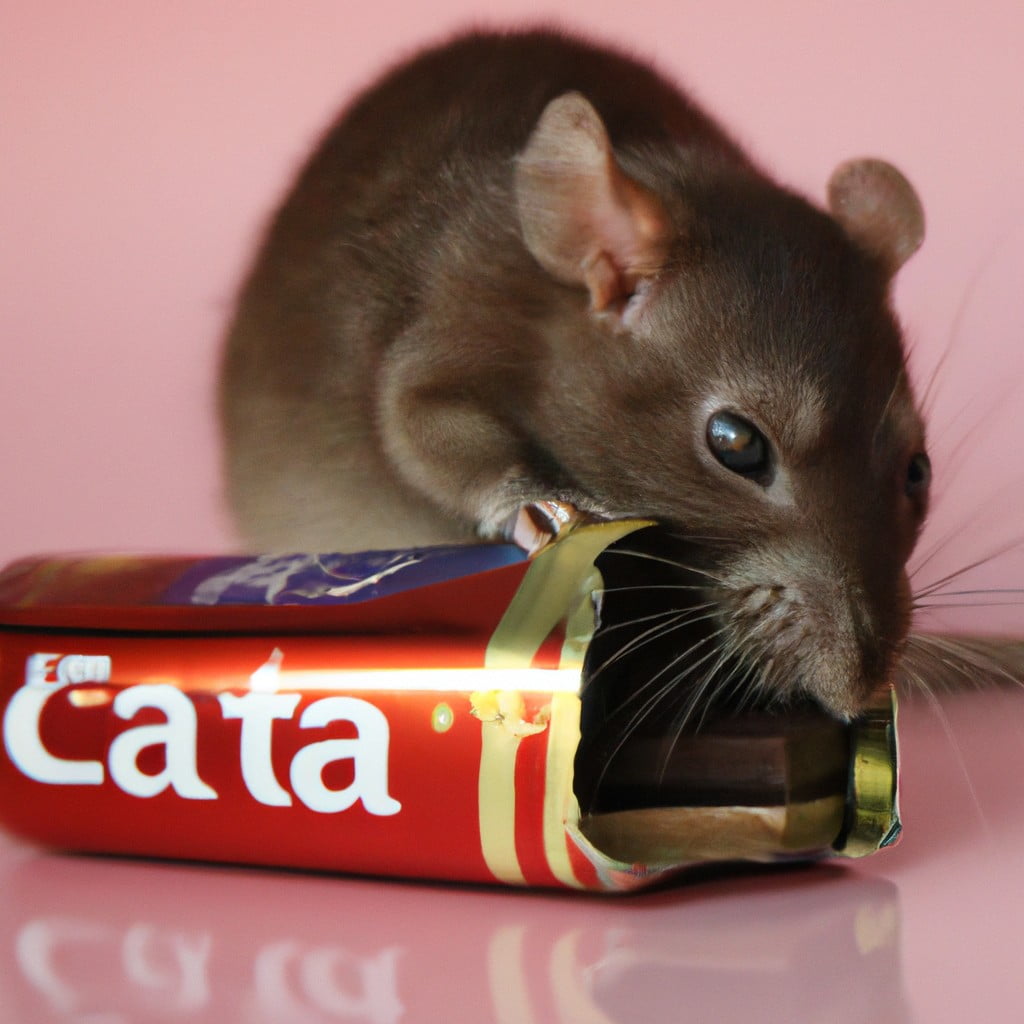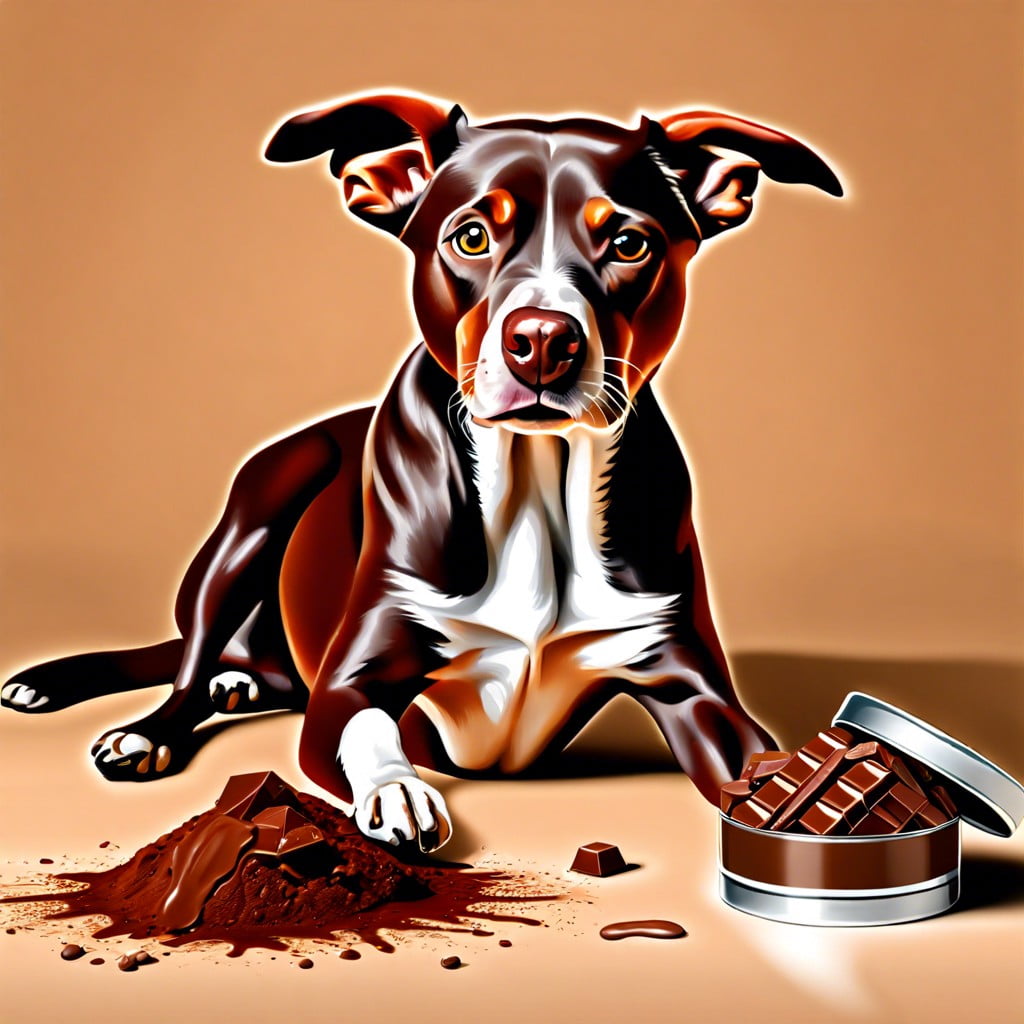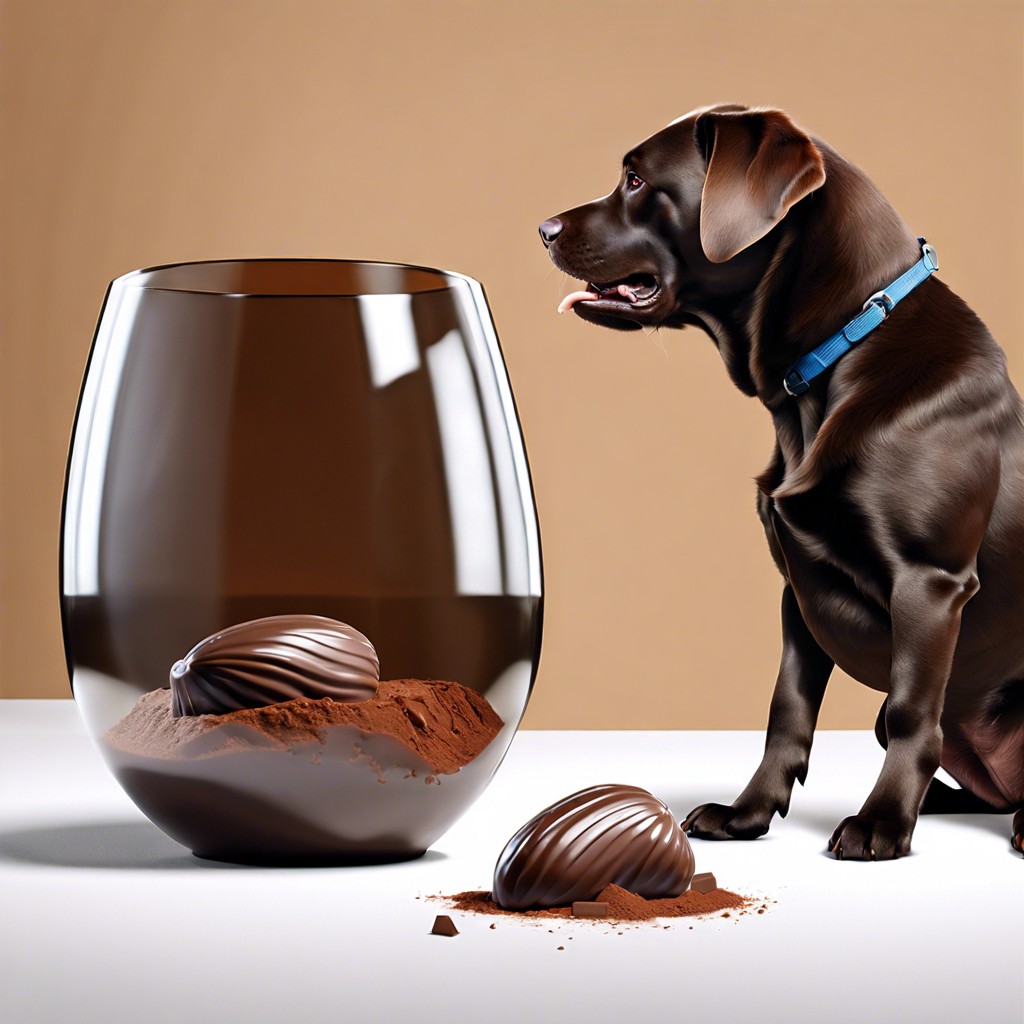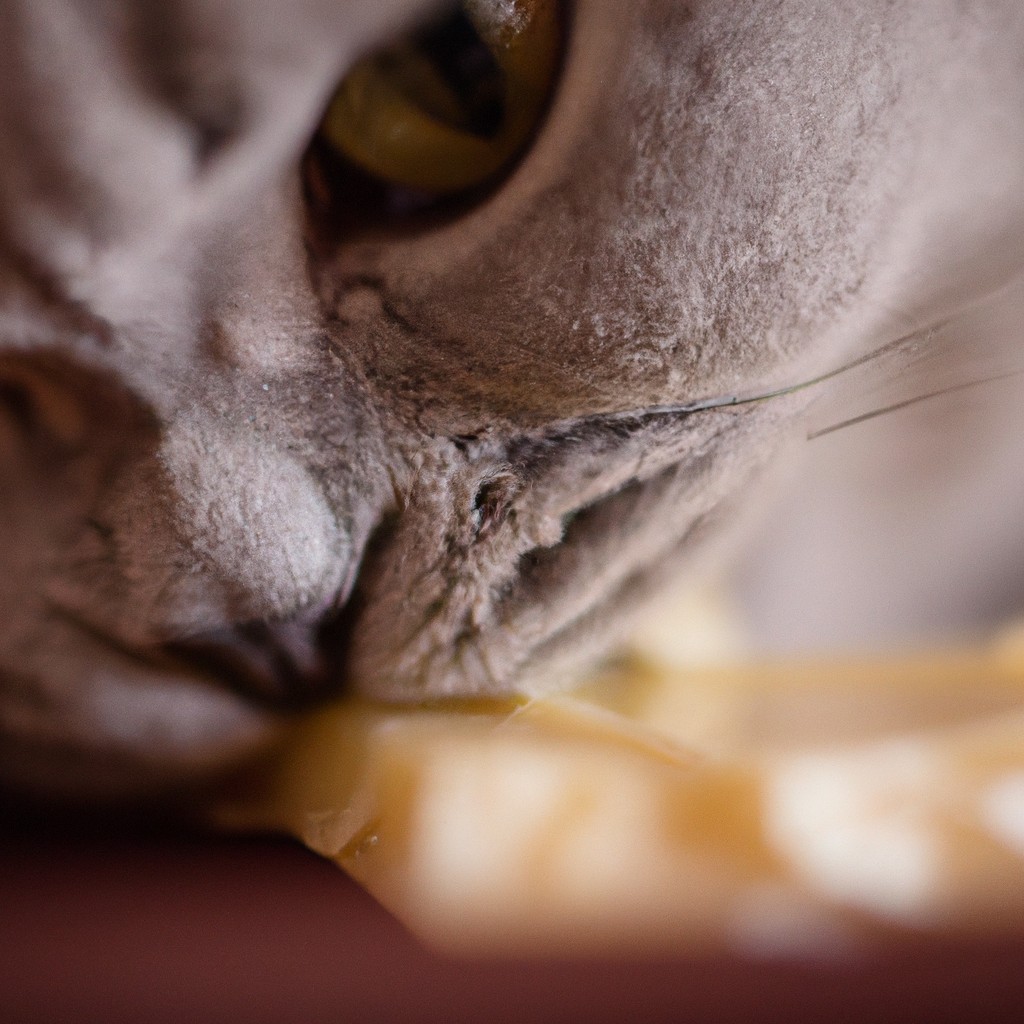No, rats should not consume chocolate as it contains theobromine and caffeine that can be toxic to them.
While chocolate might be a delightful treat for humans, it’s not suitable for rats. The main issue lies in theobromine, a compound found in chocolate, which rats cannot efficiently metabolize.
Consequently, ingesting chocolate can lead to theobromine poisoning, resulting in serious health problems or even death.
This article delves into the reasons why chocolate is harmful to rats, the symptoms of theobromine poisoning, and safer alternatives for rat treats.
Key takeaways:
- Rats cannot have chocolate due to theobromine and caffeine.
- Theobromine poisoning can be fatal for rats.
- Chocolate can lead to obesity and teeth issues in rats.
- Rats can be attracted to chocolate due to taste and aroma.
- Offer rats safer alternatives like fruits and vegetables.
Inside
Is Chocolate Safe for Rats?

Given chocolate’s popularity among humans, one might assume it to be universally adored. However, for rats, it’s a different story. On the whole, chocolate is not safe for rat consumption.
The key concern is a stimulant present in chocolate known as theobromine. Humans can process this compound without issue, yet rats struggle. Consumption can lead to theobromine poisoning, a potentially lethal condition.
Chocolate, particularly dark chocolate, also contains caffeine. Rats are sensitive to this compound, which can induce restlessness, rapid breathing, heart palpitations, and in extreme cases, seizures.
High sugar content in chocolate contributes to obesity and teeth issues in rats. These creatures need a balanced diet, and sugary treats like chocolate can lead to nutritional imbalance.
Offering chocolate to your pet rat may encourage poor eating habits. It may prefer the taste and decline healthier foods, thus jeopardizing its health further.
From these points, it’s clear that while rats may be physically capable of eating chocolate, it poses a number of significant risks. Thus, for their safety, it is best to avoid giving them chocolate.
Why Do Rats Like Chocolate?
Rats, like humans, are often drawn to sugar-rich foods due to their high energy content, making chocolate a tempting treat. However, this attraction might also be attributed to other elements present in chocolate:
- Fats and Sugars: High fat and sugar content makes chocolate a high-energy food source. Rats, especially in the wild, need to optimize their diet for energy efficiency.
- Theobromine: This bitter alkaloid provides a distinctive taste that might appeal to some rats. It’s present in cacao, the main ingredient in chocolate.
- Aroma: The unique aroma of chocolate might make it an attractive food for rats. It’s derived from hundreds of distinct volatile compounds created during the production process.
The liking of chocolate can, therefore, be attributed to different sensory aspects including taste, smell, and texture. However, enjoying chocolate should not be confused with its effects on a rat’s health, which will be discussed in subsequent sections.
Can Rats Eat White Chocolate?
White chocolate lacks the toxic component theobromine which is present in milk and dark chocolate. While this might seem to suggest that it’s safe for rats, it’s far from an ideal food for them.
White chocolate is high in fats and sugars, which can lead to obesity and other related health problems in rats. It is also devoid of any nutritional value and can negatively impact a rat’s balance diet, which should primarily consist of fresh fruits, vegetables, and high-quality rat pellets.
So, while it won’t cause theobromine poisoning, offering too much white chocolate can result in other serious health issues. Hence, it’s best to keep white chocolate out of a rat’s diet.
Can Rats Eat Milk Chocolate?
Milk chocolate differs significantly from other types in ingredients and cocoa concentration. With elevated sugar levels, milk chocolate tempers the inherent bitterness of cocoa, making it a popular choice for many. Yet, the same sweetness undermines its safety where rats are involved.
The sugar in milk chocolate elevates its calorie content, posing a risk of overconsumption and obesity in rats. Rats feature a far tinier metabolism compared to humans, hence their vulnerability to the effects of high-calorie foods. Overfeeding them on milk chocolate could result in life-threatening health issues, obesity being one of them.
Additionally, Theobromine, an alkaloid present in chocolate, is particularly harmful. While humans can easily metabolize it, the same isn’t true for rats. Symptoms of theobromine poisoning in rats often include raised heart rate, seizures, and even death in severe cases.
Lastly, milk chocolate’s lactose content could also raise digestive issues. Many rats are inherently lactose intolerant, which means that consuming milk chocolate may result in stomach aches or diarrhea.
For your pet rat’s safety, avoid feeding them milk chocolate. Instead, try offering them healthier choices such as fruits or rat-friendly treats available in pet stores.
Can Rats Eat Dark Chocolate?
Dark chocolate is characterized by a high content of cocoa solids and cocoa butter, with little to no milk. It is rich in antioxidants, but should be considered poisonous for rats. This is primarily due to theobromine, a bitter alkaloid found in cacao plants.
While it’s a beneficial substance for humans, providing stimulatory effects, theobromine is harmful to rats. They lack the necessary enzymes to break it down efficiently. Ingesting it can lead to severe symptoms including vomiting, diarrhea, rapid breathing, restlessness, increased heart rate, seizures – even death.
The toxicity of dark chocolate hinges on the concentration of theobromine it carries. The levels are significantly higher in dark chocolate than in milk or white varieties – hence posing an increased risk to the rat’s health.
Despite rats naturally avoiding food items harmful to them, they might still be tempted by the sweet, aromatic properties of chocolate. Therefore, it’s essential to keep dark chocolate, along with any other chocolate types, out of their reach.
Providing a safe, balanced diet for rats excludes chocolate altogether. Their main food components should be fresh fruits, vegetables, grains, and plenty of clean water. This will idyllically keep potential health hazards, like theobromine poisoning, at bay.
How Much Chocolate Can Rats Eat?
It’s important to understand that rats should only be fed chocolate in very small doses. Chocolate contains theobromine, a substance that can potentially be toxic for rodents when consumed in large quantities. A sliver the size of a fingernail is more than enough for a small rat. This tiny amount should not be given frequently, as regular consumption could still lead to health problems. Only give it as a rare and special treat.
Yet, the metabolic rate of a rat might combat some of the potential toxicity. Their faster metabolisms allow them to process theobromine quicker than humans.
Nonetheless, moderation and vigilance are key. Monitor your rat’s behavior post consumption. Any signs of restlessness, rapid breathing or other unusual behavior could suggest sensitivity to chocolate and require immediate veterinary attention.
How Often Can Rats Have Chocolate?
While a tiny taste of this sweet treat will likely not harm the furry friends, it’s not safe to make it a regular practice. Chocolate contains theobromine and caffeine, which can cause harmful side effects.
Here are the key ideas to understand when considering frequency:
- Intake: Rats should not be fed chocolate as a regular part of their diet.
- Theobromine and caffeine: These substances in high amounts can lead to toxicity which can be fatal for rats.
- Rat size: The small size of rats makes them much more susceptible to the effects of theobromine and caffeine than larger mammals.
- Chocolate quantity and type: Different types of chocolate contain varying amounts of theobromine and caffeine. Dark chocolate, in particular, has high levels and should be avoided.
- Consumption: If for any reason consumption occurs and the rat displays adverse symptoms like restlessness, rapid breathing, cardiac irregularities, or seizures, professional veterinary care is advised.
Stick to a balanced diet of fruits, vegetables, grains, and lean protein for your rat, while offering chocolate only as a rare, minimal treat, if at all.
Does Chocolate Kill Rats?
While chocolate might seem like a tasty treat to share with pet rats, it’s crucial to understand the potential harm. The primary reason chocolate can be harmful to rats is the component called theobromine, found in cocoa. This is toxic to many animals, including rats.
Rats have a different metabolic system to humans, and this makes substances like theobromine difficult for them to process efficiently. High levels can cause symptoms such as restlessness, increased heart rate, tremors, and in severe cases, seizures.
Dark chocolate contains higher levels of theobromine compared to milk chocolate. Consequently, it poses a higher danger to rats if ingested.
Though rats are less susceptible to theobromine poisoning than dogs, it’s still recommended to avoid giving them chocolate. Even in small amounts, it can put unnecessary stress on their tiny systems and potentially cause health complications.
Consider providing healthier, safer treats for your rat. Fresh fruits, vegetables, and specific commercially available rat treats make ideal alternatives to chocolate. It’s always better to be safe than sorry when dealing with the well-being of our small furry friends.
Chocolate caught in a rat’s teeth can also cause dental issues. These pets have continuously growing teeth, and sticky, sugary food can result in tooth decay if it becomes lodged in their teeth.
So, while it’s not instantaneously lethal, routine chocolate consumption can potentially harm your pet rat. Therefore it’s best to refrain from feeding them anything with chocolate.
In the event of accidental ingestion, it’s important to monitor your rat for any signs of distress. Increased water intake, restlessness, and difficulty breathing may indicate theobromine poisoning. Consult a veterinarian immediately if any adverse symptoms occur after your rat ingests chocolate.
Chocolate Poisoning Dosage in Rats
Knowing the chocolate poisoning dosage in rats is crucial to keep them protected. Theobromine, a component in chocolate, is hazardous for rats. Its toxicity depends on the chocolate type and the rat’s size.
Dark chocolate contains the highest theobromine level and can be dangerous even in tiny doses. Milk chocolate has less theobromine but still can be harmful. White chocolate has negligible levels, but due to its high sugar levels, it isn’t a good choice either.
The effects of theobromine include hyperactivity, increased heart rate, tremors, and, in severe cases, seizures. If your rat ingests more chocolate than it can tolerate, consult a vet immediately.
As a precautionary measure, avoid offering chocolate, especially dark or milk, to rats. Instead, provide safer alternatives such as fruits or nuts.
Remember this isn’t about limiting treats, but ensuring your pet companion stays healthy and enjoys a longer and happier life.
Alternatives to Chocolate for Rats
While chocolate is not ideal for rats due to the potentially harmful compounds it contains, there are numerous healthy and safe treat options to consider. Fresh fruits like blueberries, apples, and bananas; vegetables such as broccoli, peas, and carrots; as well as cooked sweet potato and squash, are excellent plant-based treats.
Whole grains, including brown rice, oats, and barley, can be cooked and served in moderation. High-protein foods such as cooked eggs, mealworms, and chicken can also be offered sparingly.
A small amount of nuts or seeds, like sunflower and pumpkin seeds, also make a beneficial treat, but these should be given in moderation due to their high-fat content.
Lastly, store-bought rat treats are available and are specifically formulated to meet a rat’s nutritional needs. However, it’s essential to remember that these are treats, not a complete diet, and should make up only a small fraction of your rat’s overall food intake. Always opt for variety, and ensure that your rat has a balanced diet with all the necessary nutrients for optimum health.
FAQ
Can rats have chocolate ice cream?
No, rats should not have chocolate ice cream as it is high in fat, sugar, and contains chocolate, which is toxic for them.
Can chocolate kill rats or mice?
Yes, dark chocolate can potentially kill rats or mice due to the presence of a toxic chemical called theobromine.
Are any foods poisonous to rats?
Yes, certain foods like onion, citrus fruits, walnuts, rhubarb, grapes, raisins, chocolate, sugars, and high-fat foods including dairy can be harmful to rats.
Do wild rats like chocolate?
Yes, wild rats do like chocolate due to its distinctive, attractive aroma.
What are the effects of chocolate on a rat’s digestive system?
Chocolate, particularly dark chocolate, can cause significant digestive system issues in rats due to theobromine, a substance that they cannot efficiently metabolize.
Is dark chocolate more harmful to rats than milk chocolate?
No, dark chocolate is not more harmful to rats than milk chocolate; in fact, both are equally toxic due to a substance called theobromine.
Can lactose intolerant rats consume chocolate?
No, lactose intolerant rats cannot consume chocolate, as it contains lactose which can harm them.




